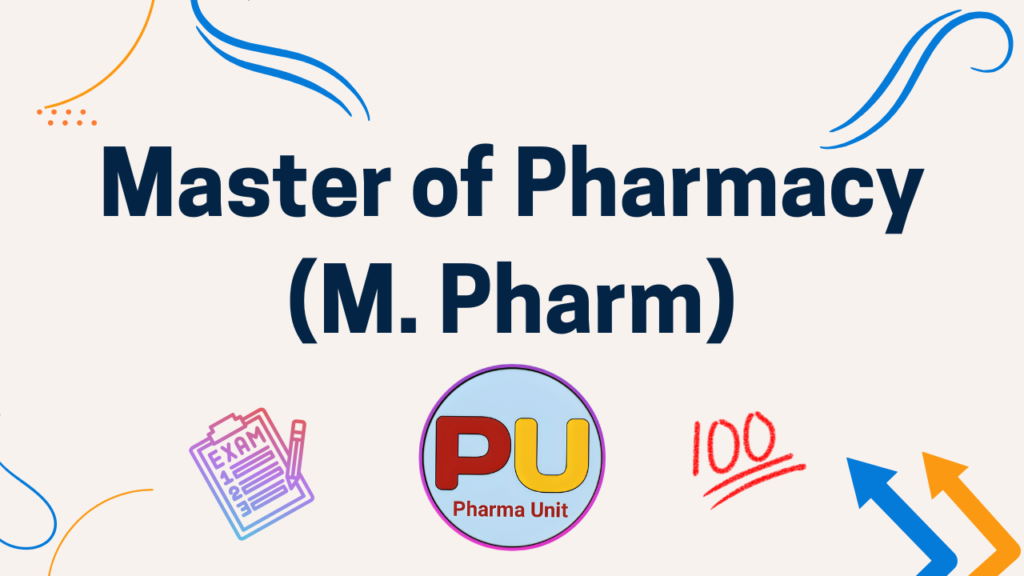After completing Bachelor of Pharmacy (B. Pharm), most students reach a common crossroads, whether to start working immediately or continue higher studies. For those who want deeper subject knowledge, better roles, or long-term growth in research, academics, or the pharmaceutical industry, Master of Pharmacy (M. Pharm) is the natural next step.

What is M. Pharm?
M. Pharm is a two-year postgraduate degree in pharmacy that focuses on advanced pharmaceutical sciences and specialization. While B. Pharm provides broad exposure to pharmacy subjects, M. Pharm allows students to concentrate deeply on one specific area such as pharmaceutics, pharmacology, pharmaceutical chemistry, or regulatory affairs. The course is approved by the Pharmacy Council of India (PCI) and recognized by AICTE, which makes it valid for academic, industrial, and research careers in India.
Eligibility Criteria for M. Pharm
To pursue M. Pharm, a candidate must have completed B. Pharm from a PCI-approved college. Most institutions require a minimum aggregate score, usually between fifty and sixty percent, though this varies by university. Admission to government colleges and reputed institutes is largely based on GPAT qualification, which also provides eligibility for scholarships. Private colleges may offer merit-based admission, but GPAT remains important for quality education and financial support.
Duration and Academic Structure
The M. Pharm course is completed over two academic years, divided into four semesters. The first year mainly focuses on advanced theoretical subjects and practical training related to the chosen specialization. Students are trained through laboratory experiments, seminars, and journal presentations to improve analytical and research skills. The final year is largely dedicated to a research-based dissertation, where students work on a specific project under faculty supervision. This dissertation is a critical component because it develops independent research capability.
M. Pharm Specializations Explained Simply
The strength of M. Pharm lies in specialization. Students select a branch based on career goals rather than trends.
Pharmaceutics is chosen by students interested in formulation development, drug delivery systems, and pharmaceutical manufacturing. Pharmacology focuses on drug action, toxicity, and research, making it suitable for clinical research and pharmacovigilance roles. Pharmaceutical chemistry emphasizes drug design, synthesis, and medicinal chemistry, which fits research and development profiles. Pharmacognosy deals with natural products, herbal medicines, and plant-based research. Pharmaceutical analysis concentrates on quality control, analytical techniques, and regulatory testing. Regulatory affairs and quality assurance specializations are industry-oriented and focus on compliance, documentation, and audits.
Subjects Studied in M. Pharm
Although subjects differ by specialization, most M. Pharm programs include advanced coursework in research methodology, biostatistics, modern pharmaceutical technologies, and specialization-specific practical training. The curriculum is designed to move students from textbook learning to research-based understanding, which is essential for professional growth.
Career Opportunities After M. Pharm
After M. Pharm, graduates are no longer limited to entry-level pharmacy jobs. In the pharmaceutical industry, they work in formulation development, research and development, quality assurance, regulatory affairs, production supervision, and pharmacovigilance. In academics and research, M.Pharm graduates are eligible to work as lecturers, research associates, or pursue Ph.D. programs in India and abroad. Hospitals and clinical research organizations employ M. Pharm graduates in drug safety, clinical research coordination, and medical writing roles, depending on specialization.
Career growth after M. Pharm largely depends on skills, research exposure, and specialization choice—not just the degree itself.
Is M. Pharm the Right Choice for You?
M. Pharm is suitable for students who want depth, specialization, and long-term professional growth. It is ideal for those interested in research, teaching, or technical roles in the pharmaceutical industry. However, students who are only looking for quick employment without interest in advanced studies may not benefit fully from this course.
Read about Career growth and salaries in Clinical Data Management.
